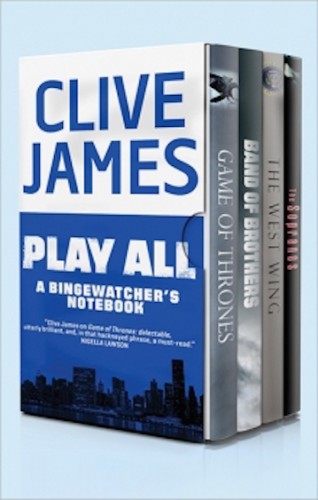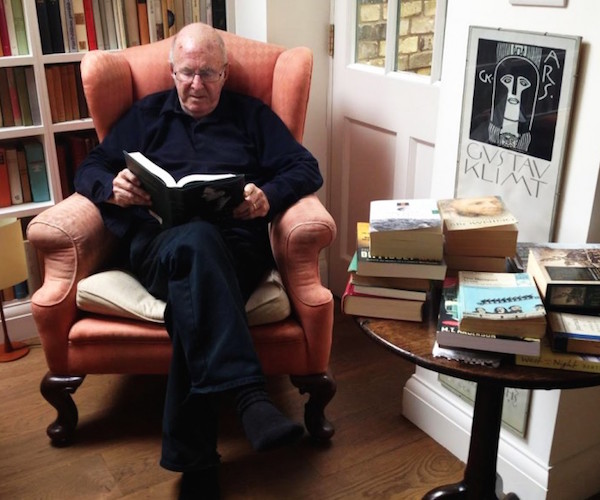Book Review: Watching TV with Omnicultural Smarts — Clive James’ “Play All”
Clive James is cosmopolitan and learned, but he’s far from a snob. He’s equally at home translating Dante by day and delightedly re-watching episodes of The West Wing at night.
Play All: A Bingewatcher’s Notebook by Clive James. Yale University Press, 216 pages, $25.

By Matt Hanson
In his new book, Clive James considers the many hours of TV he’s watched with his wife and daughters while dealing with a years- long struggle with leukemia, causing him to have more time (and a better reason) for bingewatching TV box sets than most people do.
The Australian-born, England-residing writer is a fine example of what was once referred to as a public intellectual. James’s writing has appeared widely on both sides of the pond and includes just about every possible literary form in addition to many years spent as a television presenter on the BBC and elsewhere. Cultural Amnesia, his masterful examination of 20th Century history and culture, contains multitudes but repays the reader’s attention generously, remaining engaging and witty amid all the erudition.
James is cosmopolitan and learned, but he’s far from a snob. He’s equally at home translating Dante by day and delightedly re-watching episodes of The West Wing at night. James can compare the shape-changing Duessa from Edmund Spenser’s epic The Fairie Queen favorably with Melsandre, the scarlet woman from Game of Thrones and not break a sweat.
For James, the reason for TV’s ascent is simple: the stories generate obsession are “gripping, and that always has to be the first consideration. Without that, complication and sophistication count for nothing, or else you’d actually be enjoying the later novels of Henry James.”
Refreshingly, he takes television’s recent cultural centrality in stride: “In Renaissance times bright young people knew what they were talking about when they made glancing references to Ovid’s Metamorphoses. Now the bright young people, although they are perhaps already turning into the bright early-middle-aged people, know what they are talking about when they say that two of their friends are like Josh Lyman and Donna Moss, or that another friend is a Zoe Barnes in the making, and could end up getting pushed under a train.”
In the first essay, James praises The Sopranos for its trailblazing artistry and pithy characterization, “pushing on beyond the cartoon outline and probing the soul.” It’s not just that the patrons of the Bada Bing are reflexive enough to quote line after line from The Godfather and Scarface; it’s also that “they can do that without crashing the vehicle because they’re in a bigger story than the one they’re quoting.” This remark might also apply as a good standard to the other shows James praises unreservedly, such as Band of Brothers, and the terminally overrated House of Cards, which he liked more than the original series.
When it comes to shows that serve up hours of quotable dialogue, The West Wing merits high praise. James and his family have apparently watched the complete series several times over and still come back for more. At their best, Sorkin’s screenplays contain “the most elaborately eloquent dialogue since the great days of Hollywood screwball comedy in the late 1930s and early 1940s.” James appreciates the fact that Jed Bartlett is a capable, decent fellow and an eloquent intellectual, but perhaps the critic gives Sorkin a little too much credit for “intuiting that this is the way America, and indeed the whole free world, would like the occupant of the Oval Office to be.” If only the last year of Presidential politics didn’t suggest otherwise.
As much as he enjoys The West Wing, James is also willing to call out the indulgent excesses of Sorkin’s style that made Studio 60 on the Sunset Strip such a clunker and The Newsroom only so-so. And James rightly critiques Sorkin’s perpetual romanticizing of high-IQ banter, given its underlying squeamishness about the body. In Sorkin’s world, female leads are required to justify their attractiveness by being surpassingly smart because, after all, “this is America, whose culture insists that the love object not be objectified, and that love, a thing of the spirit, must transcend lust, a thing of the mere body.” There’s nothing wrong with admitting, as James does from time to time, that TV shows can be fun to watch just because good-looking people walk around looking good in them.
Even so, it isn’t just sex appeal that makes a show interesting. James is ambivalent about Mad Men because, even though the crisp, sleekly modern look of the period is captured to a T, the real-life Mad Men “were much more conscious of what they were involved in than the show makes them out to have been.” Besides, isn’t it odd that the autodidactic Don Draper’s house doesn’t have any books? As a longtime fan of the show, I’d counter argue that we see Don reading often enough, even if it’s mostly in private.
James is also not ecstatic about Breaking Bad, a show whose main character he finds to be “plausible but dull” and he admits to an unexpected (and somewhat undeserved) loathing for Jesse Pinkman, Walter White’s impetuous young sidekick. He brings up the sad but true fact that a show like Weeds surprised people partly because most viewers weren’t used to seeing a woman as a criminal mastermind, an observation that introduces a larger discussion about the encouraging advances women have made in popular entertainment by way of taking control of their own narratives and representations, from The Good Wife to Veep to Parks and Recreation to Girls and 30 Rock.
The wealth of James’ literary and cultural references add to his analysis of The Wire, a show I already loved, and which James appreciates despite its relentless vision of despair. Detective McNulty is “Ted Hughes with a gun” and sympathizes with the portrayal of the wretched Bubbles, peddling scrap metal to survive. He perceptively points to how full of life the show is despite all the ruin — “who wouldn’t like to get drunk with Bunk?” After considering the drama’s immortal tour through blighted Baltimore, a grim city of the dead, James wisely cites Nietzsche’s aphorism that we make art so as not to perish from the truth.
I might be the last person to appreciate Game of Thrones, partly because fantasy as a genre has never sparked any real interest. Swords and dragons and muscular people in armor galloping around on horseback always feel annoyingly artificial, too cheesy and contrived. James apparently shared this skepticism at first: “George R.R. Martin writes the kind of prose that can describe a sword hand-forged from a meteorite and make it less thrilling than a can opener…I place a total embargo on dragons. I would almost rather have zombies.”

Clive James away from his television. Photo: Yale University Press Blog.
But. even though I agreed with much of this, I cheerfully admit that James changed my mind after he described his surprise that the intrigues of the Seven Kingdoms kept him captivated season after season, describing with vigor and attention clashes between fiercely acted characters with “miles of dialogue, and nearly all of it good. It’s the reason why there was never a show harder to switch off once it hooked you.” One of the most powerful merits of criticism is that it can open the reader’s mind to the fresh, appealing values of art that he or she has overlooked or ignored.
For an often-myopic American audience, James reminds us how American television inspires subversive reactions across the globe. He cites an Egyptian novelist writing about how “just before Egypt went to war with Israel in 1973, the smart set in Cairo were watching ancient reruns of Peyton Place.” When James was in Bombay filming a travel documentary, all the locals assumed he was keeping up with the latest developments of The Bold and the Beautiful. He quotes a Croatian journalist cracking wise that “Western teeth on their own would have been enough to bring down the Wall.”
It’s no secret that TV programming is in the midst of a renaissance. The shows — and the expectations of their audiences — have evolved — it is assumed that contemporary programs will be deeper, more complex, and more visually inspired than those of yore. Clearly, TV commands an enthusiastic space in the mainstream that was once reserved for movies and novels. What we need now is a criticism with the omnicultural smarts and sense of humor to help make sense of it all. With his engaging blend of scholarly chops and wit, Clive James makes an ideal viewing companion for your next night in.
Matt Hanson is a critic for The Arts Fuse living outside Boston. His writing has appeared in The Millions, 3QuarksDaily, and Flak Magazine (RIP), where he was a staff writer. He blogs about movies and culture for LoveMoneyClothes. His poetry chapbook was published by Rhinologic Press.
Tagged: Clive James, Matt Hanson, Play All: A Bingewatcher’s Notebook, Television, Television Criticism
